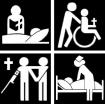 How faith-based social services do an end-run around human rights
How faith-based social services do an end-run around human rights
In the US and UK human rights remain on the law books, while religious groups take over state functions and are exempted from having to observe any human rights that they object to. This applies to religiously run schools, hospitals, social welfare agencies and prisons. Even state institutions like the military, not run by religious groups, have to fund increasing numbers of chaplains. (The massive religious involvement in German social services is the subject of many articles here.)
“The Catholic Church provides a quarter of the world’s healthcare, is the largest non-government provider of education in the world, and, through its Caritas network, distributes [not “pays for”] over US$2.6 billion annually in aid to the poor.” — Cardinal George Pell, 1 December 2012
♦ The hidden tithes of faith-based social services
♦ Faith-based gambling in Australia
♦ Social work in Britain: human rights out, proselytising in (2013)
♦ Enforcing the Vatican’s “redemptive suffering” on the dying?
♦ Church schools in England or how to get them to polish the brass
♦ Hospital chaplains instead of nurses in the UK
♦ Chaplains in Australian state schools
♦ “Are Women Still Safe in Catholic Hospitals?”
“Religious freedom must include the freedom to receive public services without being forced to listen to or accept another's religious beliefs.” [1] It must also include freedom from discrimination in hiring. Yet these rights and others are often infringed when faith-based social services receive state funding. An American study found those administering these services didn't even realise that they mustn't apply religious pressure. It also showed that the state was not in a position to monitor compliance. [2]
The rights threatened by faith-based social services include “the right to freedom of thought, conscience and religion”, (Article 18 of the Universal Declaration of Human Rights), the right not to face discrimination (Article 7), the right to one’s own private life (Article 12), the right to marry as one pleases (Article 16), the right to freedom of opinion and expression (Article 19), and the employment rights to receive equal pay for equal work and participate in collective bargaining (Article 23). Occasionally Catholic-run (but state-funded) hospitals can even threaten a woman's right not to face "torture or to cruel, inhuman or degrading treatment" (Article 4), as when she is forced to carry to term an ancephalic baby with no chance of survival. And when an at-risk woman with a nonviable foetus is denied an abortion so long as there is a heartbeat, she can also be robbed of her right to life (Article 3). This is exactly what happened to Savita Halappanavar.
Unfortunately it is only governments which have signed these human rights treaties, not religious organisations, even though in many countries these are increasingly taking over social services.
For example, while state agencies are forbidden to discriminate, state-funded but religiously- run institutions often are. In 2002 President George W. Bush, as part of his “Quiet Revolution”, changed the rules without going through Congress in order to allow religious organisations to “take faith into account in making employment decisions”. [3] Their employees can be both hired and fired on religious grounds. Staff at Catholic hospitals can even be fired for using government-funded contraception that is meant to be available to all. [4]
Another example was the tightening up in 2014 of the religious requirements for some teachers at Catholic schools. In San Francisco the Archdiocese revealed plans for a new department that sounds ominously inquisitorial, the Office of Catholic Identity Assessment. [5] And in Ohio and several other places in the US, Catholic school boards introduced new “teacher-minister contracts.” This was an attempt to enlarge the “ministerial exception” to anti-discrimination laws. Ministerial exception allows churches to hire its clergy, the caretakers of the faith, in accordance with its doctrines, even if this means excluding certain kinds of people, like women or gays. But the Catholic school board of Ohio is trying to extend this exception to teachers of secular subjects like algebra or grammar.
The new contract expressly forbids a “homosexual lifestyle” and any “public support” of one; any use or advocacy of abortion rights, surrogacy, or in vitro fertilization; “living together outside marriage,” “sexual activity out of wedlock” and any public endorsement of either. Teachers must comply with these religious restrictions despite the fact that in Ohio these schools receive significant public funding, in the form of school-choice vouchers that families can use for parochial education. [6]
The strategy is clear: leave the rights on the law books, while quietly allowing religious organisations to take over many state functions — generously subsidising them with the taxpayers’ money — and exempting them from having to observe any human rights that they find onerous. With faith-based social services the state pays and the church exercises control.
The danger in letting religion “into the public square”, is that this also means letting it “into the public purse” and “into the people’s private lives”. A relentless campaign is now underway to accomplish both. What’s at stake here are many of our hard-won human rights.
See also: "An inside look at faith-based social services in Germany"















